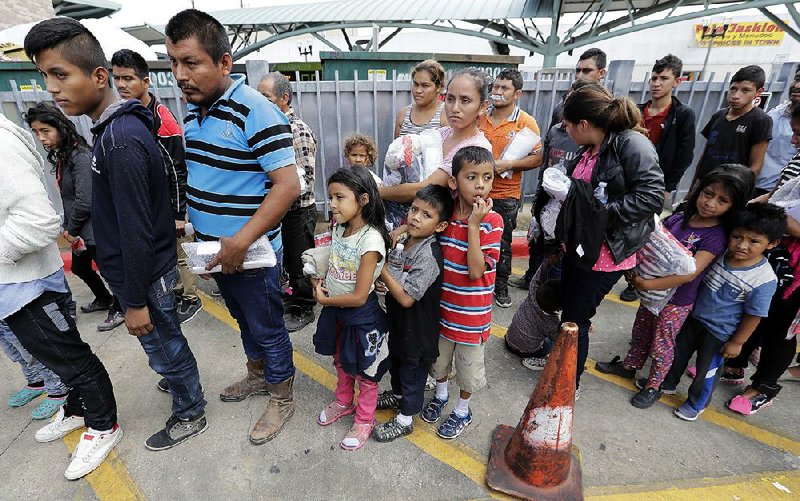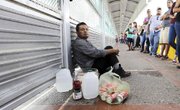WASHINGTON -- Democrats again responded skeptically Sunday to the assertion by President Donald Trump's administration that it has a process in place to reunite more than 2,000 "separated minors" with their parents, while Republican lawmakers again promised that all the children taken from their parents in recent weeks were accounted for.
In a statement issued late Saturday night, the administration said it has 2,053 children in custody in facilities around the country funded by the Department of Health and Human Services. A formal process has been established to reunite them with their parents before deportation. Until then, officials said, the children taken into custody can talk by telephone or video to a parent or guardian twice a week.
Immigration advocates and Democratic lawmakers have voiced alarm and anger over the fact that Trump's executive order last week reversing himself on the policy of separating families did not incorporate any pledge to swiftly reunite them.
But the U.S. government has reunited 522 migrant children who were separated from adults as part of Trump's "zero tolerance" immigration policy, the Department of Homeland Security said late Saturday. The department added that 16 more children were expected to be reunited with adults on Sunday, and that earlier attempts for those children were delayed because weather conditions affected their ability to travel.
Federal authorities are also readying a special reunification center at a detention center in Port Isabel, Texas.
A fact sheet on "zero-tolerance prosecution and family reunification" released Saturday night by the Department of Homeland Security and other agencies involved in the separations also says a parent must request that their child be deported with them. In the past, the agency says, many parents elected to be deported without their children, occasionally citing violence or persecution in their home countries.
Some children will remain separated from the adults they were traveling with if a family relationship cannot be established or if there are concerns about the children's safety with those adults, the statement said.
"The United States government knows the location of all children in its custody and is working to reunite them with their families," the statement read. "This process is well-coordinated."
The reunification plan will have a few exceptions, according to the late-night communique.
"There will be a small number of children who were separated for reasons other than zero tolerance that will remain separated," the statement read. "Generally only if the familial relationship cannot be confirmed, we believe the adult is a threat to the safety of the child, or the adult is a criminal alien."
The fact sheet doesn't state how long it might take to reunite families. The Port Isabel Service Processing Center in Texas has been set up as the staging ground for the families to be reunited prior to deportation.
How the government would reunite more families has been unclear because the families are first stopped by Customs and Border Patrol, with children taken into custody by the Health and Human Services Department and adults detained through Immigration and Customs Enforcement, which is under the Department of Homeland Security.
Children who were separated from adults at border crossings make up 17 percent of all minors in the agency's custody, officials said, with the rest having arrived in the United States unaccompanied.
The federal Office of Refugee Resettlement has a toll-free number set up for parents looking for their children.
But parents said they had gained little information using the number, while some have discovered that their children are being held several states away. Other parents have already been deported and are trying to locate their children from abroad. Officials said that parents who are deported from the United States can ask that their minor children leave with them.
Critics also said that many migrants in federal detention do not have a phone number where agencies can call them back.
[U.S. immigration: Data visualization of selected immigration statistics, U.S. border map]
LAWMAKERS WEIGH IN
The chairman of the Senate Homeland Security Committee hedged Sunday when pressed on whether he was confident the Trump administration knows where all the children are and will be able to reunite them with their parents.
"That is what they're claiming," Sen. Ron Johnson, R-Wis., said on CNN's State of the Union.
But Sen. James Lankford, R-Okla., who has moved to spearhead a short-term congressional fix on the family separation issue, was more explicitly confident on NBC's Meet the Press.
"Let me clarify this. We know where every single child is," Lankford said. "This is an issue that's gone out there somewhat in some of the other media that's not been responsible with this, that with the assumption that the administration lost track of that. So let me clarify a couple things. These are career professionals that work with [Health and Human Services]. And that work with [Homeland Security] in Customs and Border Patrol and [Immigration and Customs Enforcement]. These are not political appointees. These are career folks. They know where every child is to be able to connect them to their parent or their relative that came."
Sen. Bernie Sanders of Vermont, an independent who caucuses with Democrats, said on State of the Union that Democrats were not to blame on the issue.
"Clearly, anyone who looks at the record understands that the Democrats have been serious about comprehensive immigration reform," Sanders said. "We have a president who's not serious about policy."
Rep. Elijah Cummings, D-Md., said on CBS' Face the Nation that migrants stopped at the border were previously given ankle monitors and monitored with their families before they got a day in court. Federal authorities have for years used electronic monitoring devices to keep track of migrants released while they await further court proceedings.
He said separating and detaining families was less humane and more expensive.
"We have no clue as to what this is costing the United States, and how these contracts are being given out," Cummings said. "The urgency right now is to get these young people back with their parents."
Sen. Angus King, I-Maine, said the administration was neglecting the fact that most of the people illegally crossing the border in recent years were fleeing violence in Central America.
"That's one of the reasons this idea of a deterrent may not work," King said on NBC. "If you're looking down the barrel of a gun in your home community, whatever your chances are to get to a free country, you're going to take it in order to save your family's lives. So that really is what we're talking about here.
"And this is very different from the waves of illegal immigrants coming across the border 15, 20 years ago, mostly from Mexico, simply looking for jobs. Mexican migration has diminished enormously."
LACK OF DETENTION SPACE
On a typical day, more than 100 asylum seekers are released from holding facilities in and around McAllen, Texas, clutching their belongings in clear plastic bags stamped with Department of Homeland Security logos, said Norma Pimentel, executive director of Catholic Charities of the Rio Grande Valley.
They are led by volunteers to the charity's headquarters a few blocks away to shower, eat and rest -- though volunteers' first order of business is to distribute shoelaces because they are confiscated from migrants in custody to prevent suicides.
"Every day is like this. It never ends," Pimentel said.
About 70 families arrived at the Catholic Charities' McAllen shelter late Saturday afternoon, and nearly all were gone by the following day, boarding buses to cities across the U.S.
Pimentel said most of Saturday's arrivals were not charged criminally, but she didn't believe it signaled a change in the Trump administration's policy of prosecuting every illegal entry.
Authorities have moved to detain more people, even asylum seekers, but are constrained by lack of detention space, particularly for families. Immigration and Customs Enforcement has a total of about 3,300 beds at three family detention centers in Texas and Pennsylvania.
"They have a limit as to how much they can manage, and that's maybe a determining factor in how many are released that day," Pimentel said.
Patricia Lozano, 27, said she fled Honduras to find a higher-paying job and better support her three children, ages 6, 8 and 9. She was not charged criminally and never separated from her children.
She was on a grueling monthlong bus trip through Mexico when she learned that families were being separated, but she decided to take her chances.
"I was already on the journey," she said as she waited for a bus to Los Angeles to join family. "Everything turned out OK walking with God."
Abel, a 40-year-old coffee farmer from Jutiapa, Guatemala, asked for asylum at the U.S. border for himself and his 17-year-old son, Hugo. They were taken into custody Thursday, separated in the same detention center for two days, then reunited and released on Saturday.
He said he left his homeland because gangs were forcing his son to join their ranks. He asked that their last names not be used because he didn't want to endanger his wife and five daughters back home.
Abel said the word is out that families may be separated at the border.
But "necessity always makes you take risks," he said. He added of Trump: "The president says it will stop, but people keep coming."
Information for this article was contributed by Colleen Long, Will Weissert and Elliot Spagat of The Associated Press; by Laura King of the Los Angeles Times; by Nick Miroff of The Washington Post; and by Jennifer Jett and Mihir Zaveri of The New York Times.
RELATED ARTICLE
http://www.arkansas…">'Invaders' lose right to court, Trump tweets
A Section on 06/25/2018

